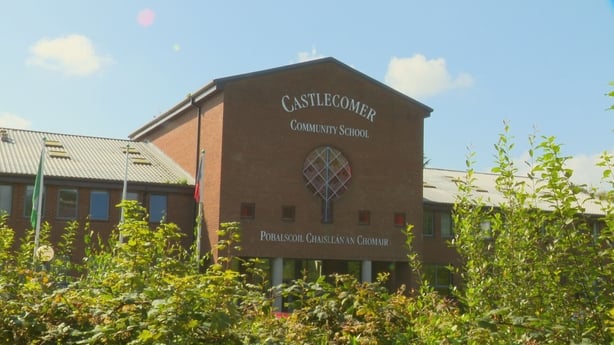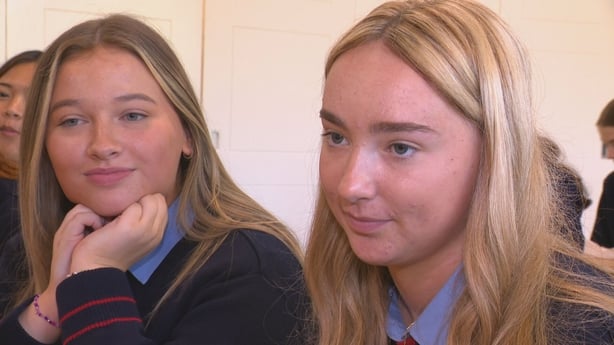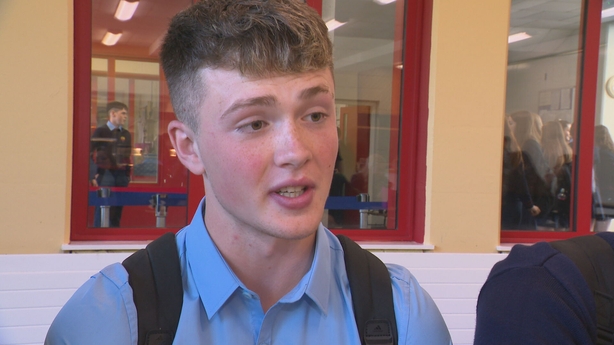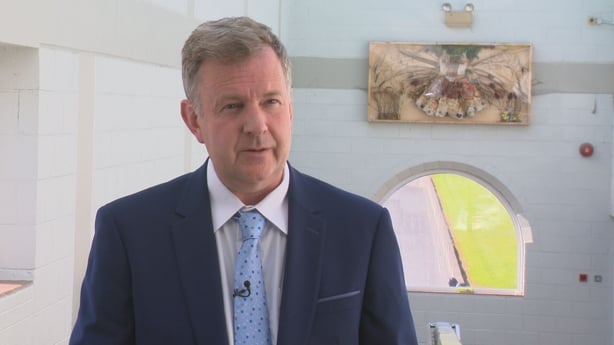The amount of time that many Irish teenagers spend on their phone is likely to have decreased significantly in recent weeks as a direct result of the reopening of schools.
Many teenagers are now guaranteed at least a few hours every weekday during which they cannot use their phones.
According to the school management body, the JMB, most post-primary schools ban or place extreme limits on the use of phones during the school day.
And a complete ban is set to become more prevalent following a recent intervention by the Minister for Education.
Norma Foley wrote to post-primary schools last week urging a complete ban on mobile phones during the school day.

There are different ways to achieve this, but school leaders agree on one thing: a ban can only be achieved with buy-in from students.
Teenagers can be tricky customers and they do not always take kindly to rules imposed arbitrarily.
Castlecomer Community School in Co Kilkenny reckons it may have been the first school in the country to ban phones when it did so eight years ago.
In the school canteen during lunchtime last Friday there was not a mobile phone in sight.
The students gathered for lunch know no different. This is the way it has always been for them.
"It's all right. It’s not too bad. It wouldn’t be a killer," 5th Year student Sophie Brennan said.
"It’s quite good in a way", Emily O’Shea added.

The ban has given students a new freedom.
"It allows you to branch out onto more people around you and get to know your classmates more" said 5th year student Grace Buggy.
"So rather than sitting in the same classroom as someone and texting them or someone in the classroom next door, you are kind of just walking around the hall getting to see them. It makes it more exciting to interact with people and develop your social skills," she added.
Josh Dowling said: "It’s just a great way to communicate with your friends. You are talking to everyone every day. To be honest with you, you wouldn’t really miss [your phone]".
There is something very poignant about hearing these teenagers describe the joy that comes with being able to communicate freely with each other, face-to-face, something so taken for granted in previous generations.
"I think phones are really important sometimes," 5th year student Shona Ruane said.
"But it is way more fun talking to your friends than you ever would have on your phone," she said.
Daniel Mooney put it succinctly: "The ban is good because it leads to people talking to each other."

The school’s mobile phone ban is laid out in its code of conduct which all students sign.
They are told they should not bring their phone into school, but it is only when a phone appears that the ban kicks in. If a phone is seen it has to be handed in at the school’s front office.
The school prefers not to use the word "confiscated".
A phone remains at the school until a parent can come into the school to collect it.
There is a landline in a small room adjacent to reception that students can use if they need to contact a parent during the school day.
Students who spoke to RTÉ News acknowledged that students do sometimes try strategies to get around the ban.
Staff reckon some are thwarted by especially poor mobile coverage in some areas of the school, such as student toilets.
Principal Pat Murphy says that among the school’s 640 students, the confiscation rate currently amounts to about one phone per week.
The school may be an oasis of calm for students, but Mr Murphy is deeply concerned about the impact that mobile phone use beyond the school gates continues to have on students.

He said: "We would find that the younger teenagers - the 11, 12, and 13-year-olds are not able for social media and the pressures it brings.
"They don’t realise that when they type something in online they are actually talking to someone, and when we get them to realise that, and that they may be saying something that they would not say to [the person’s] face then that changes their perception of it."
The issue with older teenagers is different.
"We would find with the older teenagers that mobile phone use interferes with their sleep patterns and their study patterns, even late into the night their phone is pinging in the bedroom very frequently with their friends on snapchat or whatever," Mr Murphy said.
Principals like Pat Murphy say the access children have to their phones at home, access that is often completely unrestricted, is the real problem.
"I don’t think people realise the depth of the problem; that when you are giving your 12-year-old a mobile phone you are giving them free access to the internet, and to quote Mary Aiken [cyber psychologist and writer] that is like letting them loose in a red light district", he says, "and you wouldn’t do that with your 12-year-old child".
We need your consent to load this rte-player contentWe use rte-player to manage extra content that can set cookies on your device and collect data about your activity. Please review their details and accept them to load the content.Manage Preferences
A different approach
Schools like Castlecomer are, to a large extent, relying on students to police themselves.
There is a lot to be said for this, not least because it helps them develop self-regulation skills.
"There were a few groans to start with but actually there was no strong argument against it"
But other schools are using devices like phone pouches to restrict access.
The students place their phone in a magnetic pouch which locks itself and only reopens at the end of the school day. In this way they have the comfort of knowing that their phone is with them, but they cannot use it.
Clogher Road Community School in Dublin city has introduced phone pouches this year.
Until recently the school did not allow phone use during class time, but this year it has moved to a full school day ban.
Like Mr Murphy, Clogher Road Principal Lesley Byrne knows that buy-in from students is key.
"There were a few groans to start with but actually there was no strong argument against it," Ms Byrne told RTE News.
She said: "We were expecting more resistance but bar a tiny handful it has been seamless.
"Students actually deep down know that they don’t want to be on their phones that much. Students were averaging about 7-8 hours a day online and some were 13 hours. They are intelligent young people and they know that this is not right."
Ms Byrne says students like the fact that they have just one decision to make in the day, that first act of placing their phone in the pouch to be locked.
"If a wider societal approach is taken to the use of phones then we can make great headway in reducing the negative impact of the phone on young people."
"What we really want is for our students to have a phone free experience in school. [Before the ban] students rather than sitting talking to each other in the canteen or on the corridor were on their phones. But now teachers are already noticing the difference, in how students are interacting in class," she said.
But Ms Byrne says their approach to phones is not black and white nor should it be.
"We are very mindful of the fact that there may be students with something happening at home. They don’t need to be anxious. We know that sometimes a student may need to check their phone for just two minutes," she said.
'Parents have to model this behaviour'
Both Ms Byrne and Mr Murphy know that the impact of a school ban on phones is limited.
When it comes to phone use they both say the role and influence of parents is much greater.
Ironically, Ms Byrne says some of the greatest distractions for students on their phones are text messages and phone calls from parents during the school day.
Deirdre Matthews, of school management body the JMB, says for Norma Foley’s aspiration to reach its full potential - and she believes it has potential - a broader societal response is required.
She said: "Parents have to model this behaviour.
"If a wider societal approach is taken to the use of phones then we can make great headway in reducing the negative impact of the phone on young people."
That is ultimately what the minister wants: for childhood to be ‘mobile phone free’ and for the risks associated with phone ownership among older teens to be mitigated.
These are tall orders. The impact of a school ban on phones may be limited, but it is a start.






